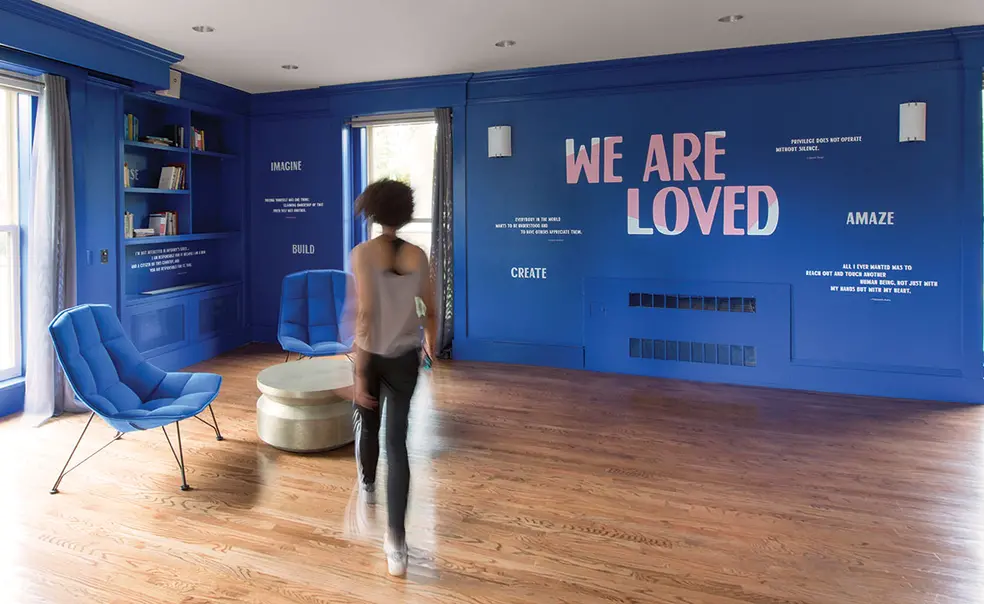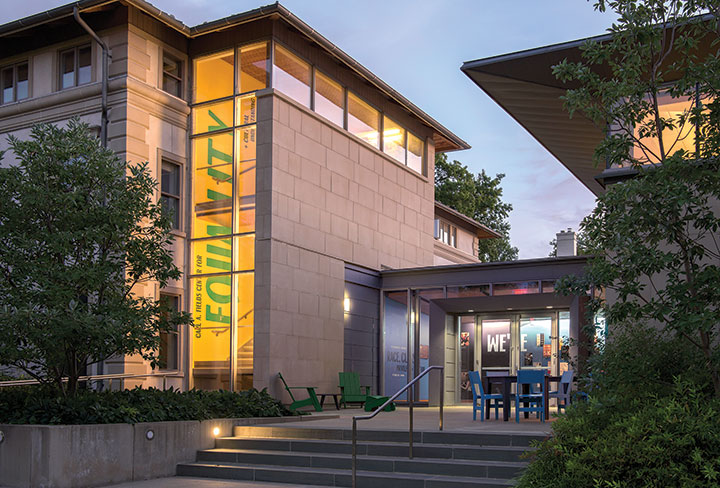Home Base: Re-energized Fields Center Reaffirms Role as Haven for Minority Students
There’s new life at the Carl A. Fields Center for Equality and Cultural Understanding.
Over the years, the center had drifted from the purpose it had served for nearly half a century. Conceived as a haven for minority students — a place where students could build a community, interact in important dialogues, and engage in cultural events — it had become more of a home for administrative events.
That started to change in the fall of 2014 as the country faced growing racial tensions, and student protests erupted on campus. In May 2015 a University task force on diversity, equity, and inclusion recommended refining the mission of the Fields Center to focus on “providing a welcoming home base for students of color,” providing additional staff and funds, and making the facility more student-friendly.
Today, the center clearly states its mission on its website: “We acknowledge and question race, class, privilege, and culture at Princeton and beyond. ... Diverse perspectives and experiences of race, class, gender, and their intersections are supported and challenged, questioned, and answered.”
Renovations have given the building a different atmosphere. “We wanted the center not to look like any other space on campus because we are a unique space, we are a unique program, and we wanted to reflect that,” said Tennille Haynes, director of the center.
On the first-floor walls are portraits of minority alumni, including former first lady Michelle Obama ’85 and Supreme Court Justice Sonia Sotomayor ’76; inspirational quotes relating to social justice; and a history of the Fields Center and the center’s namesake.
On the second floor are four cultural-affinity rooms for black, Asian, Latino, and Arab and Middle Eastern students; each room was designed by students and has its own personality in terms of wall decorations and furniture.
Kauribel Javier ’19, co-president of Princeton Latinos y Amigos, said the center is one of the only places on campus where she sees herself represented. Other buildings have pictures primarily depicting white men of the University’s history, she said.
“When you walk in, you notice you’re comfortable being there, which is not how I feel in other spaces on campus,” Javier said. “We feel like we are valued there, our identities are valued, and our experiences are valued.”
That feeling is not uncommon, said Vice President for Campus Life W. Rochelle Calhoun: “The reclaiming and ownership of the space really resonates with the students and they feel it now, so therefore they behave differently in terms of how they actually utilize the space.”
The Fields Center was originally known as the Third World Center, and was located on Prospect Avenue across Olden Street from its current location in the former Elm Club. Founded in 1971 in response to student protests, the Third World Center was formed to support and provide a social and political space for minority students.
Some students took issue with the center’s name in the late 1990s, and the University trustees voted in 2002 to rename it after the assistant dean at Princeton who was the first African American administrator in the Ivy League, Carl A. Fields. “The Carl Fields Center still holds true to the original purpose of the Third World Center,” Haynes said.
Administrators declined to disclose the center’s budget, but the task force reported that the provost provided $400,000 in new funding to the Fields Center, the Women’s Center, and the LGBT Center for programming and staffing. The Fields Center is hiring two new program coordinators. Calhoun called the increased funding an “institutional investment” in the center’s growth.
Following a change in policy, Haynes said, all events held in the building must be consistent with the Fields Center’s four “pillars”: engagement, empowerment, leadership, and action. The center hosts or co-sponsors about 25 events each semester, she said, with about 200 people attending larger events and 25 to 50 attending smaller programs.
Among the events this year were a Black Lives Matter program with the father of Michael Brown, who was killed by a police officer in Ferguson, Mo., in 2014; and a Princeton Latinos y Amigos event with Pulitzer Prize-winning author Junot Díaz. The center also hosts “Wellness Wednesday” events, poetry corners, and dialogues with the Fields Center Fellows, a group that encourages intercultural communication about issues of social justice.
Freshman orientation now includes learning about the Fields Center, and every incoming minority student has the opportunity to be mentored by an older student.
The campus has experienced “difficult conversations” in recent years, reflecting national events, Haynes said. “Everyone on campus had to step up and recognize what was happening. ... I think we’re going to have a lot of continued issues around race and diversity in this country, on college campuses, in general, for quite a while. There’s always more to do in those areas.”













1 Response
Evangeline Lew ’10
8 Years AgoRedesigning the Fields Center
I enjoyed Anna Mazarakis ’16’s coverage of the recently revamped Carl A. Fields Center (On the Campus, April 26). The center’s ability to create a welcoming and empowering space for all students owes much to its colorful and thoughtful redesign, which includes many quotes and photos specific to Princeton’s unique history and the experiences of its students.
This beautiful reimagining of the space is the work of two Princeton alumni, Andy Chen ’09 and Waqas Jawaid ’10, who are also members of the advisory group to the Princeton Campus Iconography Committee and have done branding work for many other prominent centers, programs, and conferences at the University.